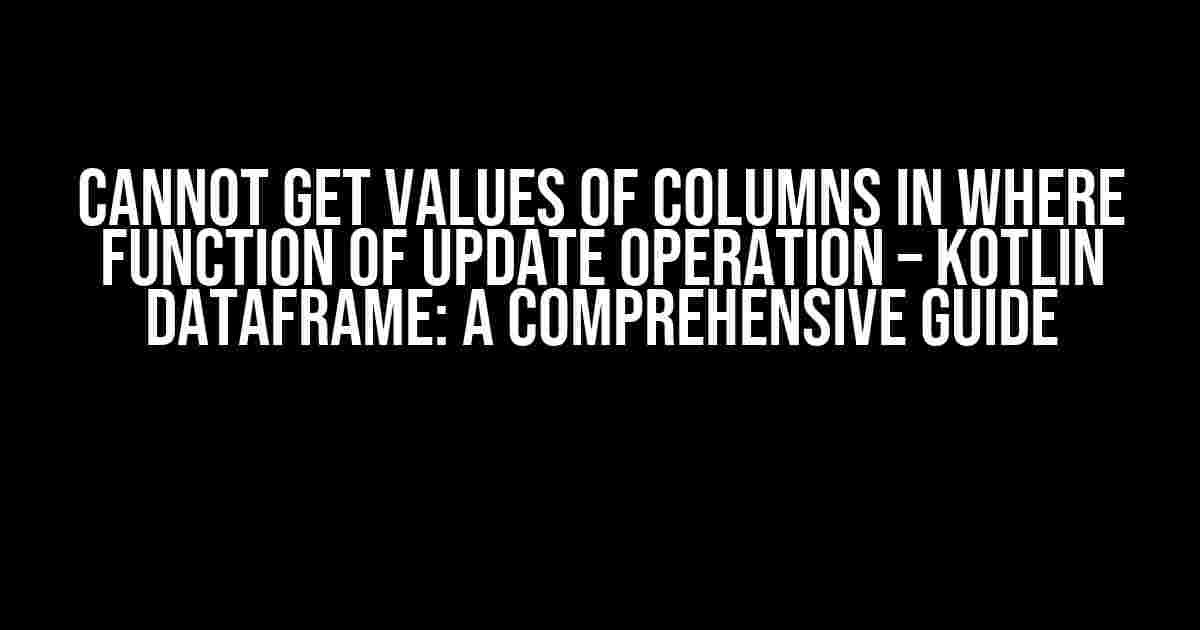Are you tired of struggling with the “Cannot get values of columns in where function of update operation” error in Kotlin Dataframe? Do you find yourself scratching your head, wondering why this error keeps popping up? Worry not, dear reader, for we’ve got you covered! In this article, we’ll delve into the world of Kotlin Dataframe and provide a step-by-step guide on how to overcome this frustrating error.
What is Kotlin Dataframe?
Kotlin Dataframe is a powerful library that allows you to work with data structures in Kotlin. It provides a concise and expressive way to manipulate and analyze data, making it a popular choice among data scientists and engineers. However, like any powerful tool, it requires a good understanding of its intricacies to use it effectively.
The Error: “Cannot get values of columns in where function of update operation”
So, what exactly is this error, and why does it occur? The error message “Cannot get values of columns in where function of update operation” typically appears when you try to update a Dataframe using a condition specified in the `where` function. For example:
val dataframe = seqOf(
1 to "Alice",
2 to "Bob",
3 to "Charlie"
).toDataFrame("id" to IntType, "name" to StringType)
dataframe.update {
set("name", "New Name")
where {
col("id") eq 1
}
}In this example, we’re trying to update the “name” column to “New Name” only for the rows where the “id” column is equal to 1. However, the error message will appear, and the update operation will fail.
Why Does the Error Occur?
The error occurs because the `where` function in Kotlin Dataframe is not designed to work with the `update` operation. The `where` function is meant to filter the Dataframe based on a condition, not to update the Dataframe.
In Kotlin Dataframe, the `update` operation is performed using a separate syntax, which involves specifying the new values for the columns and the conditions for the update operation. The `where` function is not a part of this syntax, and attempting to use it will result in the error message.
How to Overcome the Error
So, how do we overcome this error and update our Dataframe successfully? The solution is simple: use the correct syntax for the `update` operation!
Syntax for Update Operation
The correct syntax for the `update` operation in Kotlin Dataframe is as follows:
dataframe.update {
set("name", "New Name")
where("id" eq 1)
}Notice that we’ve removed the `where` function and instead used the `where` keyword as part of the `update` syntax. This tells Kotlin Dataframe to update the “name” column to “New Name” only for the rows where the “id” column is equal to 1.
Using Conditional Expressions
Sometimes, you may need to update the Dataframe based on a more complex condition. In such cases, you can use conditional expressions to specify the update condition.
dataframe.update {
set("name", "New Name")
where(col("id") eq 1 or col("id") eq 2)
}In this example, we’re updating the “name” column to “New Name” for the rows where the “id” column is either 1 or 2.
Common Scenarios and Solutions
In this section, we’ll cover some common scenarios where the “Cannot get values of columns in where function of update operation” error may occur, along with their solutions.
Scenario 1: Updating Multiple Columns
What if we need to update multiple columns based on a condition? The solution is to use the `set` function multiple times:
dataframe.update {
set("name", "New Name")
set("age", 25)
where("id" eq 1)
}In this example, we’re updating both the “name” and “age” columns for the rows where the “id” column is equal to 1.
Scenario 2: Updating Columns Based on Another Column’s Value
What if we need to update a column based on the value of another column? The solution is to use the `col` function:
dataframe.update {
set("name", col("username"))
where("id" eq 1)
}In this example, we’re updating the “name” column to the value of the “username” column for the rows where the “id” column is equal to 1.
Best Practices and Tips
Here are some best practices and tips to keep in mind when working with Kotlin Dataframe:
-
Always use the correct syntax for the `update` operation. Avoid using the `where` function, and instead use the `where` keyword as part of the `update` syntax.
-
Use conditional expressions to specify complex update conditions.
-
Test your update operations on a small sample of data before applying them to the entire Dataframe.
-
Use the `show()` function to inspect the updated Dataframe and verify that the update operation was successful.
Conclusion
In conclusion, the “Cannot get values of columns in where function of update operation” error in Kotlin Dataframe can be frustrating, but it’s easily overcome by using the correct syntax for the `update` operation. By following the guidelines and best practices outlined in this article, you’ll be well on your way to mastering Kotlin Dataframe and performing complex data manipulations with ease.
| Scenario | Solution |
|---|---|
| Updating a single column based on a condition | Use the `set` function and specify the condition using the `where` keyword |
| Updating multiple columns based on a condition | Use the `set` function multiple times and specify the condition using the `where` keyword |
| Updating columns based on another column’s value | Use the `col` function to reference the other column’s value |
We hope this article has been informative and helpful in resolving the “Cannot get values of columns in where function of update operation” error in Kotlin Dataframe. Happy coding!
Did you find this article helpful? Share your thoughts and feedback in the comments below!
Frequently Asked Question
Stuck with Kotlin Dataframe and update operation? Don’t worry, we’ve got you covered! Here are some frequently asked questions to help you out.
Why can’t I access column values in the where function of an update operation in Kotlin Dataframe?
This is a known limitation in Kotlin Dataframe. The `where` function in an update operation can only access the column names, not their values. This is because the `where` function is used to filter rows, not to access column values. If you need to access column values, consider using a different approach, such as using a `when` expression or a custom function.
How can I update a column based on a condition in Kotlin Dataframe?
You can use the `when` expression to update a column based on a condition. For example, `df.update When(df[“column_name”] > 10, df[“column_name”] * 2)`. This will update the column `column_name` to its double value when the value is greater than 10.
Can I use a custom function in the where function of an update operation in Kotlin Dataframe?
Yes, you can use a custom function in the `where` function of an update operation. However, the function must return a boolean value indicating whether the row should be updated or not. For example, `df.update Where(myCustomFunction(df[“column_name”]))`. Make sure to define the custom function before using it in the `where` function.
How do I update multiple columns in Kotlin Dataframe?
You can update multiple columns by chaining multiple `update` statements. For example, `df.update(“column1”, expr).update(“column2”, expr)`. Alternatively, you can use a single `update` statement with a map of columns to update. For example, `df.update(mapOf(“column1” to expr1, “column2” to expr2))`.
What is the difference between update and withColumn in Kotlin Dataframe?
The `update` method updates an existing column, while the `withColumn` method adds a new column or replaces an existing one. `update` is typically used when you want to modify an existing column based on a condition, while `withColumn` is used when you want to add a new column or replace an existing one with a new value.


